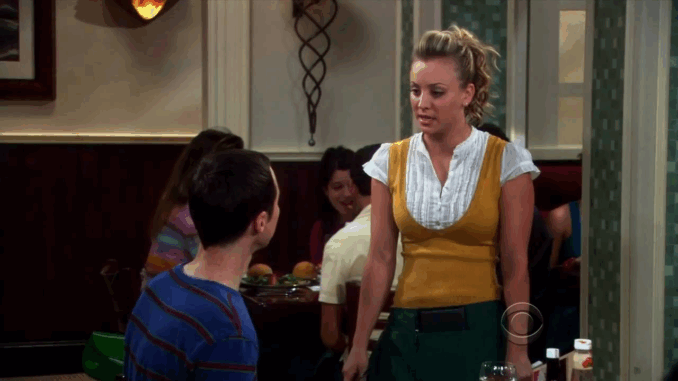
Breaking the Stereotype
When audiences first met Penny, she was the classic “girl next door” — blonde, bubbly, and seemingly out of place among the socially awkward geniuses across the hall. But The Big Bang Theory quickly revealed that Penny, portrayed with charisma and depth by Kaley Cuoco, was far more than a sitcom stereotype. Over 12 seasons, she evolved from an aspiring actress working at The Cheesecake Factory into one of the show’s most emotionally grounded and indispensable characters.
Penny stood in stark contrast to the other main characters. She didn’t hold a PhD or talk in Star Trek references, but she brought a kind of real-world wisdom and emotional intelligence that no textbook could teach. In many ways, she served as the audience’s gateway into this unfamiliar world of quantum mechanics, comic books, and social ineptitude.
A Catalyst for Growth
Penny’s relationship with Leonard wasn’t just central to the plot — it was essential to the show’s emotional trajectory. While Leonard was often idealistic about love, Penny carried the emotional scars of disappointment. Her reluctance to fully embrace Leonard’s world came from real fears — of inadequacy, of settling, and of repeating past mistakes.
But through their rocky journey, Penny’s character blossomed. She began as someone who may have dismissed “nerds” as outsiders, yet eventually became the person who fiercely loved them. Her marriage to Leonard wasn’t just a romantic victory; it was a statement of how people from vastly different backgrounds can evolve, compromise, and build something lasting.
What makes Penny particularly compelling is that her growth never felt forced. She wasn’t rewritten to be more intellectual — she remained true to herself, even as she deepened her empathy and sense of identity. Her rejection of a high-paying pharmaceutical sales job to focus on her own happiness marked a turning point: Penny was no longer just a support character; she was making her own choices, on her own terms.
The Female Friendship That Redefined the Show
One of the show’s most satisfying arcs was Penny’s evolving relationship with Amy and Bernadette. What began as awkward bonding moments — like brunches filled with uncomfortable silences — matured into one of television’s strongest female friendships. These three women, so different in backgrounds and personalities, came to support one another in ways the men often couldn’t.
Penny, in particular, played the role of confidante and protector. She helped Amy break out of her shell, encouraged Bernadette’s assertiveness, and became the person both turned to in times of doubt. Their friendship gave the show balance, shifting it from a purely male-driven narrative to a more inclusive ensemble dynamic.
Humor, Heart, and Humanity
Penny’s humor wasn’t rooted in science or geek culture — it came from her sharp wit, social savvy, and ability to call out absurdity with a single glance. Whether she was deadpanning in response to Sheldon’s endless rules or navigating Leonard’s insecurities with a smirk, Penny’s timing was always impeccable.
But what truly made her resonate with viewers was her heart. Penny often acted as the emotional translator for the group. She comforted Sheldon during his meltdowns, supported Howard and Bernadette after they had their child, and even developed a surprising, sweet bond with Amy. She didn’t just tolerate the quirks of her friends — she embraced them.
Kaley Cuoco’s Transformational Role
Kaley Cuoco’s performance was a masterclass in subtle evolution. Without ever losing Penny’s charm or spark, she added layers of vulnerability, strength, and nuance. Cuoco navigated the transition from comedic foil to emotional lead with finesse, anchoring the show’s more heartfelt moments while still delivering laughs.
It’s worth noting that Penny is one of the few major characters in the show whose last name was never revealed. This mystery, whether intentional or not, adds a layer of intrigue — perhaps reflecting how Penny always retained an element of mystery in a group obsessed with order and classification.

A Voice for the Viewers
In many ways, Penny represented the average viewer — someone who might not understand physics but understands people. She asked the questions audiences were thinking, challenged the absurdities of nerd culture, and brought emotional insight to situations that others approached analytically.
Her presence balanced the show’s heavy focus on intellect with much-needed doses of spontaneity and warmth. And while she might not have solved equations on a whiteboard, Penny solved countless emotional riddles the others couldn’t begin to understand.
Final Thoughts: The Soul of the Series
Penny began as the outsider — a waitress chasing uncertain dreams. But by the series’ end, she was the heart of the group. She reminded us that emotional intelligence is just as valuable as academic brilliance, and that empathy often speaks louder than facts.
Her journey mirrored that of the show itself: unexpected, occasionally messy, but ultimately rewarding. Penny didn’t just find a home among the physicists — she helped build one.